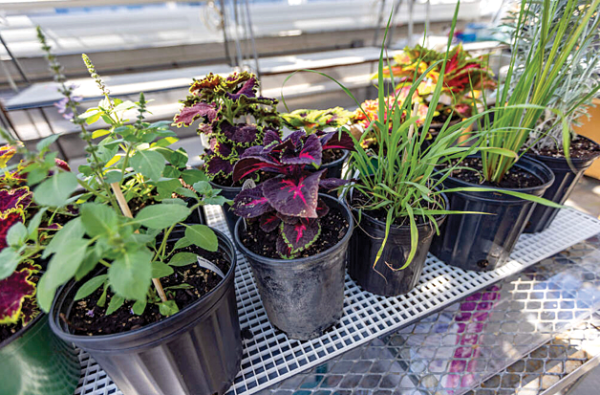September 25, 2024

Psychedelic plants such as holy basil, coleus and lemongrass are growing in the greenhouse for research at Massachusetts General Hospital.
Jesse Costa/WBUR photo
Voters will soon decide whether to legalize plant-based psychedelic drugs in Massachusetts. A majority “yes” vote on Question 4 on the November ballot would approve the use of natural psychedelic substances, like psilocybin mushrooms, for people 21 and older at licensed therapy centers.
Massachusetts would then be the third state, following Oregon and Colorado, to legalize certain psychedelics, with state law creating a regulatory framework for their therapeutic use. But like cannabis, substances like psilocybin and mescaline would remain illegal at the federal level.
What exactly would Q. 4 do if passed? – The law would create a five-member “natural psychedelic substances commission” to oversee the new psychedelics industry. Similar in structure to the state cannabis control commission, the members would be chosen by the governor, attorney general, and treasurer.
What your vote will mean – A “yes vote” would allow persons over age 21 to use certain natural psychedelic substances under licensed supervision and to grow and possess limited quantities of those substances in their home. It would also create a commission to regulate those substances. A “no vote” would make no change in the law regarding psychedelic substances.
The commission would license “psychedelic therapy centers,” where people 21 and older could take certain drugs under the supervision of a licensed facilitator. The law would allow for the cultivation and sale of five types of substances: dimethyltryptamine (DMT), mescaline, ibogaine, psilocybin, and psilocyn. The commission would be tasked with defining who is allowed to administer the drugs. The first centers would not open until at least 2026.
People would not be able to buy psychedelics at retail shops, like marijuana dispensaries. However, the law would decriminalize possession and the limited growth of the drugs at home for personal use.
What do supporters argue? – Proponents argue that limited legalization would be another important step in reversing the government’s decades-long war on drugs. They also point to studies showing psychedelics’ potential as a treatment for people with depression or those struggling with addiction.
Today, Boston is a hub for research into psychedelics and mental health. The Center for the Neuroscience of Psychedelics at Massachusetts General Hospital is looking into a possible treatment that combines psychedelics and MDMA with psychotherapy to treat post-traumatic stress disorder (PTSD) in veterans, among other related studies.
Meanwhile, Dana Farber is investigating whether psilocybin eases depression in patients with cancer. Advocates say residents deserve access to potentially revolutionary therapies.
“Voting yes on Question 4 will give veterans, patients with end-of-life distress, and people who are suffering access to this life-saving mental health tool,” said Jennifer Manley, a spokesperson for Massachusetts for Mental Health Options, which has been the driving force behind the campaign. «Psychedelic medicine can provide healing and hope where other mental health treatments have failed.»
Massachusetts for Mental Health Options is funded by the Washington, D.C.-based New Approach PAC, which also led the legalization efforts in Oregon and Colorado. The committee has received more than $4 million in donations and in-kind contributions since its launch in the summer of 2023, primarily from wealthy donors like TOMS Shoes founder Blake Mycoskie, actress Eliza Dushku, who is best known for her role in “Buffy the Vampire Slayer,” and All One God Faith Inc., the company behind Dr. Bronner’s soaps.
What do opponents argue? – Opponents worry about a proliferation of drugs that will remain federally illegal. The law would allow people to grow their own psychedelic plants in a space no larger than 144 square feet, as long as they’re secured from anyone under 21. The Colorado psychedelics law also allows for limited home growth, while Oregon does not.
“A black market is inevitable with this amount of home growth,” said Chris Keohan, a spokesperson for the Coalition for Safe Communities, a committee formed to oppose the ballot question.
Detractors also point to issues of cost and access. Early evidence from Oregon shows psychedelic treatment can cost people from $800 to $2,500 out of pocket.
“This measure prioritizes for-profit corporate interests over public health and dangerously and unnecessarily decriminalizes psychedelics for recreational use and distribution statewide,” Keohan said.
This article was published by WBUR on Sept.20. The Reporter and WBUR share content through a media partnership.


